Is “Geek Culture” Embracing Our Inner Child, or Infantilising a Generation of Adults?
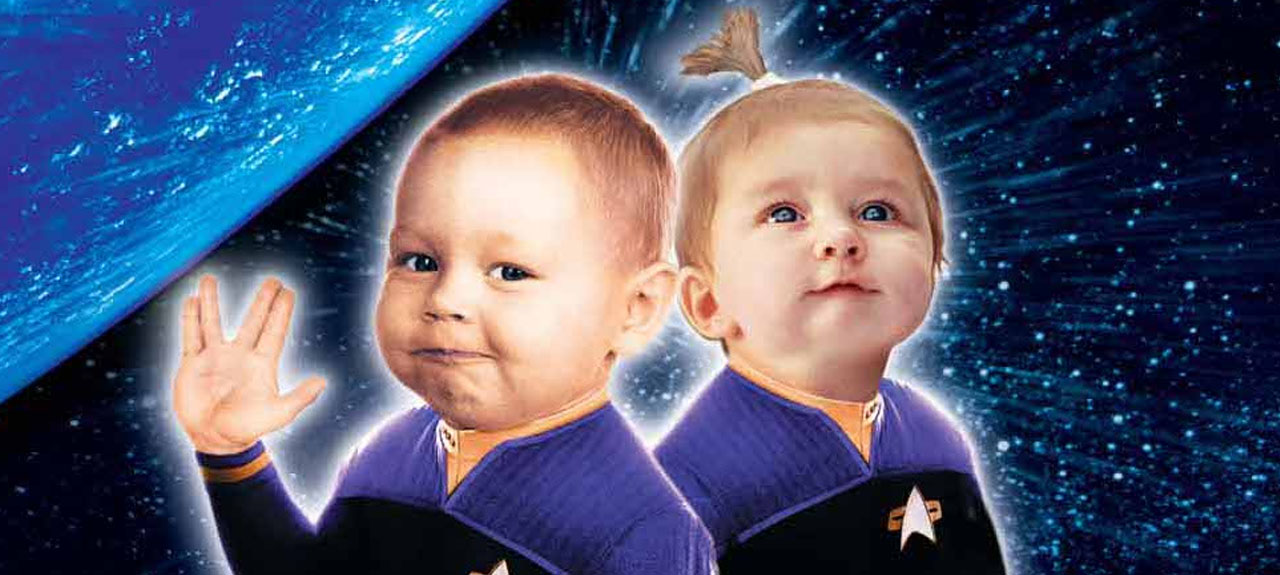
Ever heard the expression: “Revenge is a dish best served cold”?
People will often reference this as sage advice handed down through the ages by ancient Chinese philosophers like Sun Tzu or Confucious. This is partially true. These are ancient words passed down from generation to generation by a society that reveres its own history and cultural traditions. There is only one problem.
It is a Klingon proverb.
This pearl of wisdom which has been regarded as part of our own human history was, in fact, part of the Star Trek universe. Some have argued that it was heavily inspired by Pierre Choderlos de Laclos’s 1782 novel, Les Liaisons Dangereuses.
“La vengeance est un plat qui se mange froide.”
But regardless of its origins, both examples are works of fiction.
These references have permeated our culture so deeply that we don’t have to be a fan, or even see the source material, to understand. Consider the popular misquote of The Empire Strikes Back: ‘No, I am your father.’ became ‘Luke, I am your father.’; just as the line ‘Hello, Clarice,’ never appears in Jonathan Demme’s Silence of the Lambs. Hannibal Lecter actually says: ‘Good evening, Clarice’. Still, the misquoted lines are woven into our popular culture.
Embracing fiction is nothing new. People have been doing it for millennia, but the paradigm has shifted over generations. The silent ‘traditionalist’ generation believed that silly stories about space trekking aliens or fantastical tales of elves and dwarves fighting in the woods are meant entirely for children. The baby boomers believed that a series like Star Trek or Lord of the Rings are enjoyable, but they are just stories and nothing more. Now, generation Xers and millennials have embraced their favourite fictional entities as a religious experience, blending these characters and worlds into their everyday lives and filling their homes with merchandise like religious paraphernalia.
We have definitely embraced the world (or worlds) of fiction, but is this growing obsession healthy? Is it good for our culture to infuse fiction with fact? Can we live by their moral codes like the mythological tales that came before them? Or will we devolve into delusion and start to lose grip on reality?
Cosplay and Keeping Our Inner Child Alive

One of the biggest shifts in the entertainment industry over the last twenty years was the introduction of conventions like PAX West and Comic-Con. Fans come to these conventions to bond with like-minded individuals, hear insights from the cast and crew and possibly get small snippets from their favourite franchise’s latest instalment. It is a way to demonstrate pride, adoration and allegiance to their favourite books, movies and television series; much like a religious person attends church to reaffirm their beliefs.
It is common for fans to dress as their favourite characters, walking around the convention as Harley Quinn or Princess Leia without a second glance. This cosplay culture is not perceived as childish like it would have been by previous generations; instead, it is seen as embracing your ‘inner child’, allowing yourself to succumb to the wonder and innocence of youth.
The world is hard for adults. You must consider bills and taxes, and you must go to work five days a week to pay said bills and taxes. Part of this cosplay fascination derives from a need to shed those adult responsibilities and return to the innocence of childhood. It also stems from another disappointing revelation: As adults, faults become more apparent. Back in the 90s, when many of us were children, we would love watching Pokemon and Power Rangers; but to go back now, unclouded by nostalgia, they are not quite as we remember them. As an adult, you notice how cheaply produced and repetitive they are; and through more cynical adult eyes, it is clear that many, though not all, of our cherished childhood favourites were merely a front to sell merchandise.
There is definitely something soothing about shaking off the shackles of adulthood and enjoying something for what it is.
But is this really a healthy thing for grown adults to do? Some would argue that this is just a bunch of lost children trying to prolong their childhood in their own metaphorical Neverland. But haven’t we been doing that for generations? Going back to the 50s, it was perfectly normal for people to run game nights; for grown adults to play Charades and Monopoly, reverting to a childlike state of play. For decades, there have been large groups of people who play tabletop RPGs like Dungeons and Dragons well into adulthood: a game that was literally invented as an extension of childhood storytelling with toys and imaginative play.
So perhaps things have not changed as much as people think. Perhaps people have always been searching for outlets to temporarily relax from their adult woes, and maybe cosplay and conventions are the new generation’s way of achieving this.
Blurring the Lines Between Fact and Fandoms
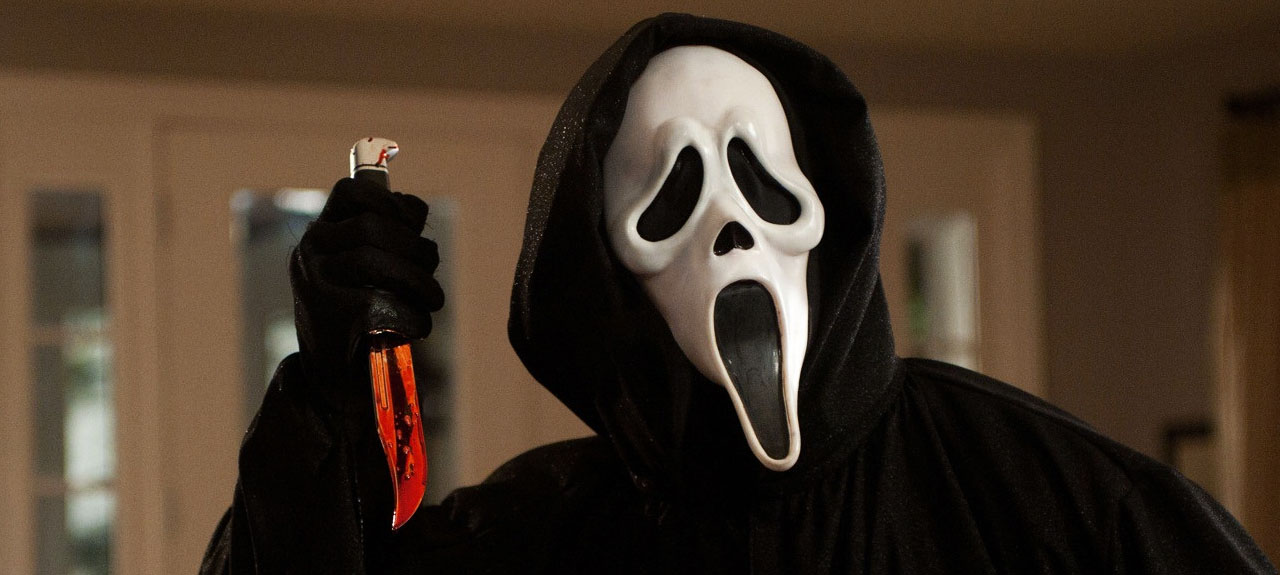
“…films, football, beer and above all, gambling filled up the horizon of their minds.” George Orwell ~ 1984
This quote from George Orwell’s 1984 expresses his belief that the people of our world would succumb to obsession with fiction and fanaticism. This obsession with entertainment would become the primary concern of the world’s citizens; disregarding the very real atrocities happening right under their noses.
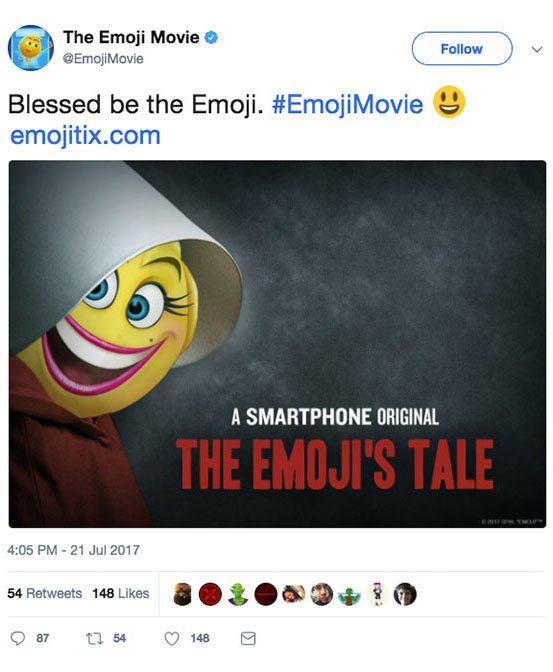
In the advent of The Emoji Movie earlier this year, Twitter exploded with outrage as the film’s official account released an image in very poor taste, satirising The Handmaid’s Tale. The core of the outrage was that the advert made light of the suffering of women; but some Twitter users even went as far to compare The Handmaid’s Tale to Schindler’s List and 12 Years a Slave.
This highly offensive comparison does the very thing it is claiming outrage over. In comparing the fictional dystopian novel’s emotional validity to Schindler’s List and 12 Years a Slave, two films very heavily steeped in actual history, they have completely belittled the suffering of real people. Should the fictional trials and oppression of Offred have the same emotional heft as the very real African-Americans who were beaten, raped and forced into slavery and servitude? Or do her problems compare to the estimated 15 to 20 million people killed or imprisoned during WWII under Hitler’s regime? These were real Jewish, Afro-Germanic and mentally disabled people; real gay men; and real people who harboured a dissenting opinion. These men and women were starved, subjected to stomach churning experiments and killed in the most horrific ways. Surely, their stories should be elevated above those of fiction.
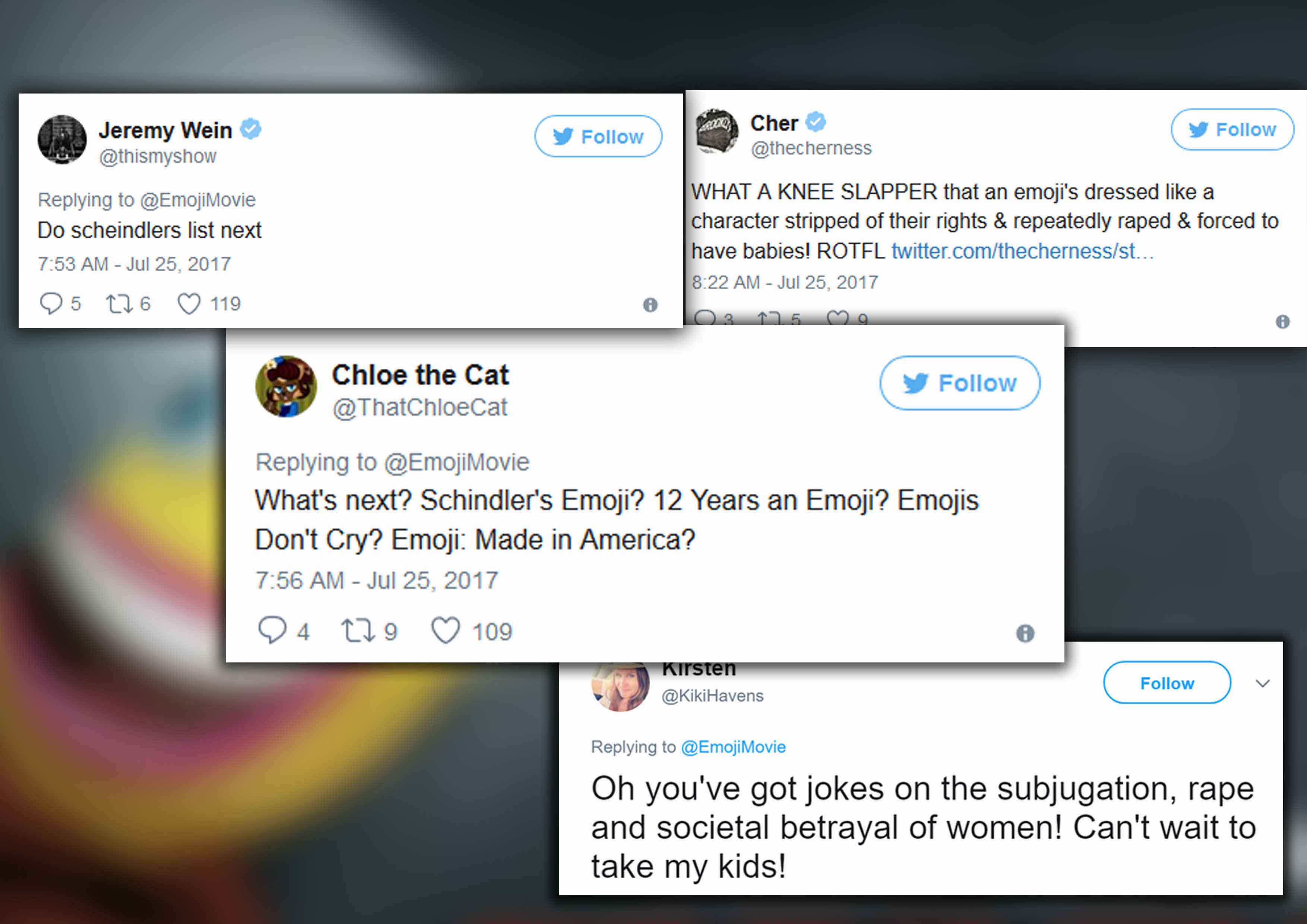
It also raises a big question: At what point should we stand for social justice against a parody of a completely fictional story as we would a real-life event? Star Wars was heavily inspired by Nazi Germany and the rise of Hitler. Does mimicking Star Wars then mock the plight of anybody who suffered under the Third Reich? Can we take any parody of Zootopia as an affront to the underlying tones of racism and racial oppression? This is the dark side of immersing yourself in a fictional world like some pseudo-religion. People blend these stories with reality, giving them the same credence as real historical tragedies.
This is not an isolated incident, and it is not restricted to any particular political faction. We have seen it from both sides of the political coin: whether it be social media using Sansa Stark’s rape as evidence of a real-world sexual assault epidemic, or right-wing news outlets claiming that by virtue of Zootopia‘s inclusive message, young people everywhere will flock to the polling booths to vote for Hillary Clinton like a hive of autonomous bees; both examples painting a bleak picture of a future where people are stripped of their abilities for critical thinking and rational debate.
Statistics published by the FBI show that there has been a steady decrease in rape cases in the US since 2011 (the year that Game of Thrones first aired). This is not to diminish the atrocious things that victims of these assaults have endured, the life-long impact they will face, or the work that still needs to be done to stop it. Game of Thrones is not responsible for the reduction in these heinous crimes, but it is certainly not contributing to them. Regardless of your stance on these issues, we must create a divide between fiction and reality and stop blurring the lines. Both of these examples claim that our society is so caught up in the worlds of fiction that we will be unable to distinguish the difference; that we will throw our moral compasses out the window and head straight for Bedlam.
Game of Thrones is one of the most popular shows in television history, but we don’t see too many people fix their squabbles with trial by combat; and despite the large number of voting-aged viewers of Zootopia, it didn’t change the outcome of the 2016 election. These claims are baseless and dangerous. Thankfully, the vast majority of viewers do not use Game of Thrones as a how-to-guide. People aren’t tuning in to Everybody Loves Hypnotoad just yet.
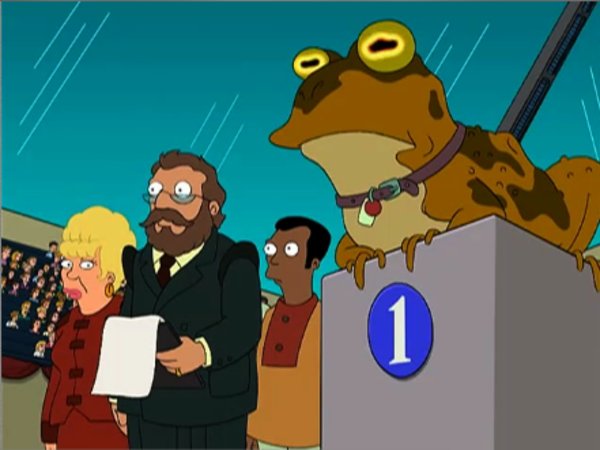
But if we are so invested in the works of fiction, how much of the messages will rub off on us?
“Don’t you blame the movies. Movies don’t make psychos. Movies make psychos more creative.”
This quote from Scream perfectly encapsulates the human relationship with fiction (and no, the irony of using a fictional quote to justify an opinion is not lost). But the 1996 meta-slasher film really did hit the nail on the head: You need to have a predisposition to being a serial killer or believing that sexual assault is okay; and research has suggested that political preferences are more likely to be shaped by those of your families and friends growing up than the entertainment industry. Any sane person wouldn’t let their real-world actions be determined by the events of their favourite television show or film.
Previous life experience has formed the notion, the film just reinforces it.
But does this mean that there isn’t any value to narratives; that they are merely a distraction that help ease the pain of living in an imperfect world? That is also too simple an explanation. Though we need to differentiate between the truth and fiction, we also must understand that narratives have valuable purposes beyond entertainment.
Wanting for a Better World (or Relishing Someone Else’s Misery)
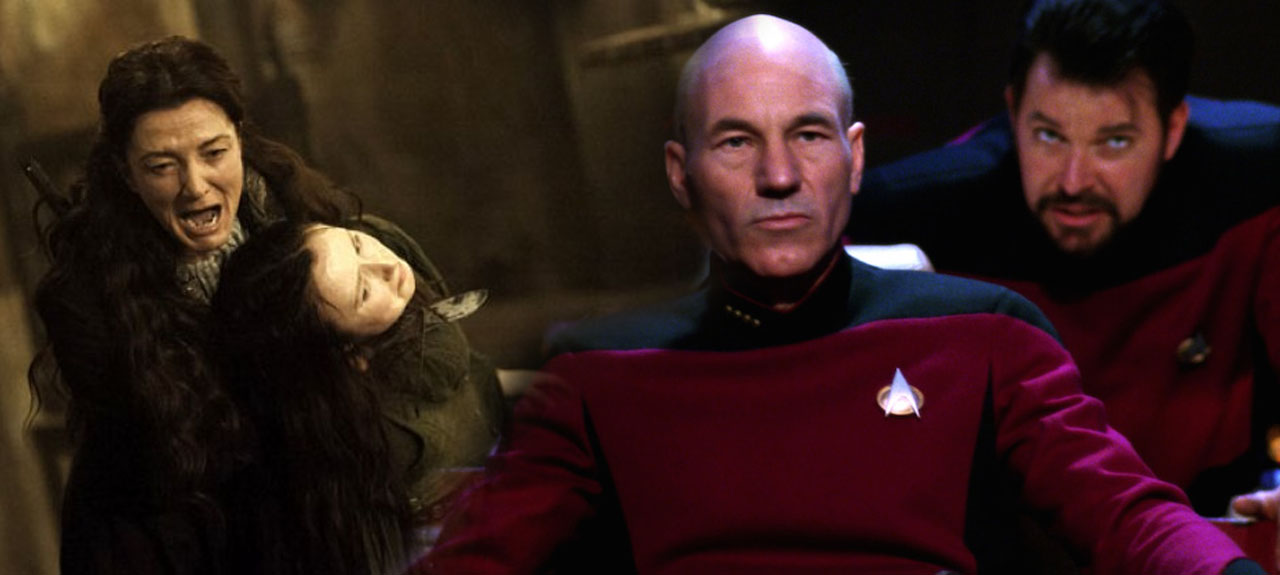
People are not drawn to stories simply by the promise of exciting plot twists and heart-pounding action, but something much deeper.
One might argue over the superior value of particular stories (e.g. Star Wars vs Star Trek, The Hunger Games vs Divergent), but everyone has a favourite movie, book or television show. Everybody has that character that resonated with them, or that moment in a story that made a lump form in their throat. So, Why do people embrace these worlds (sometimes to an obsessive degree) when they are nothing more than somebody’s creative daydreaming that has been put on the page or screen?
There are two reasons for this, and they both have very different consequences for the modern viewer who treats their favourite ‘fandoms’ to an obsessive degree.
Even going back to the legends from Greek, Sumerian and Japanese culture (just to name a few), stories have been used to explain the unexplainable and give us moral lessons about our own humanity. A modern example of this is Star Trek. While the series has changed over the various iterations, it has always retained a philosophical approach that explores all facets of humanity, from racism to transgender issues; all leading to a larger humanist message that we should treat people the same. No better. No worse. Using these stories can have positive effects on a generation that takes their fiction seriously. Somebody who loves Star Trek and treats it like a religion will transfer its humanist message that might one day bring them closer to the Utopian future of Starfleet.
There is another reason why people find themselves drawn to narratives. It is catharsis, both for the writer and the consumer, that can express deeper emotions that lurk beneath the surface. A series like Game of Thrones shows the other side of the narrative coin to Star Trek. People tune in every Sunday to watch Game of Thrones because they become so invested in the characters that they feel genuine emotion when they are sexually abused, have their eyes gouged out, or are ambushed at a wedding. This cathartic expression is a healthy way of releasing pent up emotion that might otherwise lead to depression, anxiety or any number of mental health issues, but there is a darker side to this narrative appeal: The dehumanisation of real world atrocities.
Dehumanisation is nothing new within human society; we have been using it to justify horrible actions since morality was first conceived, but now cultures around the world embraced social media. There are clear advantages to this. It has connected us the world over; people who once knew each other in high school are suddenly reconnected, and friendships are made stronger with everyone being in constant contact with each other, but it has also led to a distancing from the real world. You only need to look at the comment sections on YouTube to see how easily people can dehumanise a content creator so they don’t feel the same guilt they would saying it to their face, and this trend is only compounding by a society of fans who embrace these fictions as though they are real. We start to lose sight of our priorities; then, when a character we’ve loved for five seasons dies in a horrific accident, we give that death more credence than a real human being that we see on the news who has suffered a similar fate. Also, this exposure to such things, if not properly distinguished, can numb us to the severe impact of these real-world stories. We have become so adept at dehumanising news stories about car accidents or global famine that even though our minds know they really happened, they are still not associated that with the real world.
Both sides of storytelling immersion have their purposes, whether it is to teach us a valuable lesson about our humanity or some greater emotional truth; but it is important to never lose sight of the fact that these are fictional worlds with fictional characters and while they may reflect our values, they should never be used as genuine representations of our world, and they certainly shouldn’t be prioritised.
Collecting or Hoarding: The Rise of Funko Pops and Other Merchandise

As children, we all collected toys of our favourite intellectual properties, and periodically checked them after we watched Toy Story to see if they were holding secret meetings about keeping us happy (Admit it, you did it too).
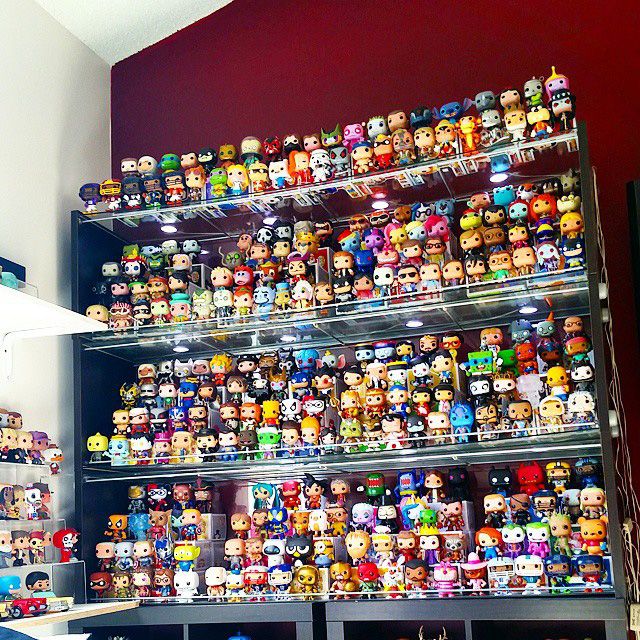
Going back a few generations, the most people would display their IP loyalty was to wear a shirt emblazoned with a logo from their favourite shows, but this was generally reserved for the upper echelons of hard-core sci-fi/fantasy fans. Now, it has become common for licensed clothing to be sold in department stores like Kmart and Target.
Merchandising has become a more lucrative business than making the books, films or television series themselves. The market has exploded with Pop! Vinyls to fill this exact market. Funko makes these cube-headed, button eyed dolls for most shows from Game of Thrones to The Golden Girls. If you love a moderately popular television show, your favourite characters have, or soon will be, produced into a pile of plastic adorableness that can be yours if you shell out the cash.
But if you plastered your house with merchandise back in the era of the baby boomers, you might have been certified an insane hoarder with delusional tendencies. So who is right? Are we devolving as a society, infantalised and staying in our family homes for far too long? Or is this simply an outlet for young people being crushed by the burden of adulthood?
Ultimately, the real question is: Does it matter? People have always collected knick-knacks to display throughout their home for their own aesthetic pleasure. Does it really matter if those knick-knacks are branded with a Starfleet logo or the sigil for House Targaryen? While it may be unusual in the eyes of previous generations, these twenty dollar trinkets are not going to stop you from functioning as a grown adult. You are still able to work your job. You are still able to engage socially with the people around you. You are still able to be a responsible adult; so long as it has no bearing on how you contribute to society, it shouldn’t be deemed shameful or childish. These people aren’t hurting anybody with their collections. In the words of Chief Wiggum from The Simpsons: “I say: If it feels good, do it.”
Farming Fans as Commercial Commodities
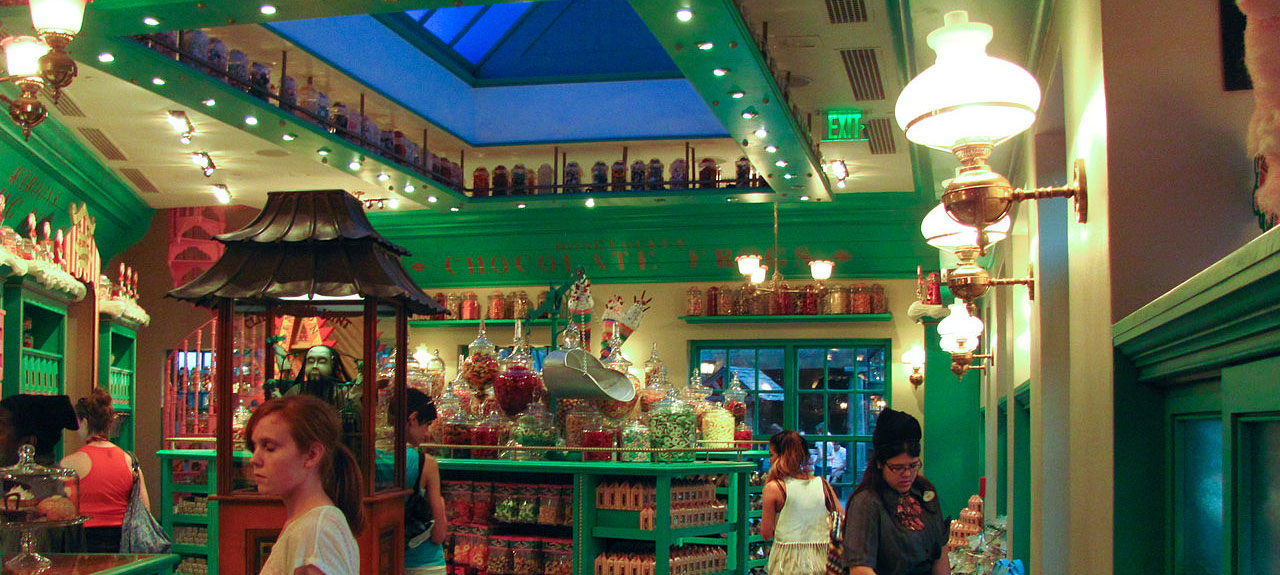

After the release of Star Wars in 1977, western culture saw a large spike in merchandise for popular franchises. This was only exacerbated during the 80s and 90s with the introduction of blockbusters like Jurassic Park, Independence Day and Harry Potter. These children of the 80s and 90s, who were exposed to more merchandising than any generation that came before them, are all grown up. They have experienced a lifetime of collecting products to demonstrate their commitment to their favourite franchises, and merchandising departments have picked up on this. For every Star Wars figurine intended for a child, there is a replica lightsaber or life-size Darth Vader worth hundreds or even thousands of dollars. Over the years, merchandising has become such a big market that a franchise like Star Wars, whose films have made billions of dollars at the box office in recent years, make more money from merchandise than they do the actual films.
This can lead to problems from a narrative point of view. When the merchandising department is making the most money, it would be a wise business choice for the studios to let these toys and play-sets dictate where the narrative goes; rather than looking at the introspection that makes stories so engaging. When it becomes more important to have a new kind of lightsaber we can peddle to the masses rather than exploring the dangers of being too idealistic (like Star Wars has explored in the past), we lose sight of what made us fall in love with the stories in the first place.

Also, if millennials are spending all their money on replica Harry Potter wands or Star Trek Enterprise pizza cutters, they are not saving as diligently as their predecessor. The rate of young people buying houses has never been lower. It has been documented that this decline has been the result of an increase in student loans and rental prices. We have also seen a spike in people having to take several part-time jobs rather than a single full-time job. Nobody can to deny that these challenges stand in the way of millennials to achieve the dream of owning your own home, but there is also an element of a shift in priorities. Millennials don’t have the same goals as the previous generation (just as the previous generation varied from theirs). The baby boomer’s generation would have seen a cable subscription as a frivolous expense that was only for people who could afford such things; nowadays, subscription services like Netflix, Hulu and HBO Go are seen as a necessary utility, like electricity or water. Though the issue isn’t as clear cut as all millenials are on the couch watching Game of Thrones all day while their parents pay for their lifestyle, their thirst for entertainment (and all associated merchandise) as a necessary commodity can cause for some financial strain on the housing market. Perhaps there is a chunk of the new generation that simply doesn’t prioritise owning their own home. Perhaps some would rather rent and spend the extra money on tickets to Comic-Con or a three thousand dollar original 1977 remote controlled sandcrawler.
Young people are embracing the world of fiction more than their predecessors. That is undeniable; but there are pros and cons to this new found obsession. People who embrace the fictional worlds can take on their moral messages and apply them to real life, but if we become too invested in them, we start to disconnect from reality and lose part of the humanity that these stories are ironically trying to teach us. Ultimately, what it comes down to is that while fiction can hold a mirror up to us and give us introspection, it should be clearly defined as fiction. It shouldn’t hold the same weight as something that happens in the real world. In addition to this, if people are collecting trinkets and wearing licensed apparel, or if once a year they dress as Han Solo and spend the weekend at Comic-Con, it shouldn’t matter. If you are able to function as an adult within society, and you can appreciate the power of fiction without forgetting its not real, then there is no harm in indulging ourselves in morality tales from Hogwarts or Tatooine; in fact, if harnessed correctly, we might even be able to use those life lessons to make our real world a better place.
What do you think? Leave a comment.











One of my pet peeves in movies and television is when characters are written with one defining trait and every thing they say or do is based on this. The reason why I hate this is because that’s not how people are in real life… It’s like these people are just poor characters in a shitty sitcom, but in real life. They don’t have their own identity. I’m a HUGE Black Sabbath fan, and I never miss an opportunity to discuss it with people, but I don’t let it define my personality. My personality just so happens to fit with Black Sabbath. These people are letting all of their personality go to the Harry Potter gods, and it’s obnoxious.
Agreed. Though you love an intellectual property, you should be able to exist outside of that fictional world; have some interests from our own world.
I’m a pretty big nerd but even i never understood why people make such a big deal about stuff that at the end of the day just doesn’t exist and is made to make profit.
Camaraderie, maybe? Or, as noted, longing for a better world? “I keep on waiting, waiting on the world to change…”
When people turn fictional stories into religious experiences, you lose me. There are definitely things you can learn from fiction (all good writing contains a moral message), but there does need to be that distinction between fact and fantasy.
I love Star Wars, Star Trek, Dr Who, anime, etc., but I don’t understand people who seem to wrap their whole identity up in these franchises. And all this Star Wars marketing just seems tacky to me. Star Wars oranges? Star Wars coffee creamer? Star Wars soup? WTF does Star Wars have to do with my groceries? I’m sure the movie will be entertaining, but this over-commercialization will cheapen any deeper artistic value it might have.
I completely agree. Fingers cross The Last Jedi isn’t a 150 minute long commercial (I don’t think it will be, but with some of the shameless movies that have been released in recent years, you never know).
“Geek” culture isn’t new, nor is it a pox on humanity. But when college humanities departments started exalting TV shows and comic books as “contemporary literature,” something went VERY wrong.
Absolutely. There is even value in examining these films and television series and extracting their core values and discussing them, but we need to take a step back and realise it is just fiction; which probably needs to be said for universities and their treatment of ‘classic literature’.
Shakespeare’s plays were popular media. The only difference between Hamlet and Star Trek is time.
Finally, one of my favorite pending posts made it to the lineup! Yea! I’m fairly new to fandom culture, having found fandom niches recently (Once Upon a Time and Harry Potter being the two with the biggest populations, although I’ve also embraced my adult Disney nerd). Now that I consider myself part of fandoms though, I also see how important they are to young adult culture.
As you noted, being an adult is much harder than it was during our parents’ generation, at least when it comes to buying homes and keeping jobs (don’t get me going on my personal experiences with those). So if I, and other young adults like me, can be nostalgic through geek culture, I say bring it. I love the fact that I can have a Funko Pop replica of Regina Mills on my desk, or wear a Ravenclaw scarf with my overcoat, and people think it’s fairly normal or even cool.
But I do have to admit, geek culture as we know it now isn’t as adult-friendly as it could or maybe should be. I don’t think university humanities courses should build themselves around things like comic books and Harry Potter, because that only makes the humanities look silly and childish compared to STEM. And I have to admit feeling a little self-conscious and icky when I spend money on say, a Disney novel that takes characters down new routes, or an American Girl book I didn’t get to read as a kid. Then again, I’m physically disabled and have always worried that if adults see me buying those things, they’ll think I’m also mentally affected, so maybe that’s why. That’s a whole other subject, anyway. I think it would be easier if we could have the nostalgia without the stigma, but unfortunately, the rest of the world isn’t there yet. As icky as that can feel, bottom line, I say screw it. If the adult world won’t let me keep a job, buy a house, or raise a kid, they might as well let me have my freaking Disney princess ceramics collection and a replica wand (Beechwood, unicorn core, 10.5 inches, slightly springy).
So long as grown adults don’t shirk their adult responsibilities in everyday life, what they do in our downtime to unwind doesn’t matter, and is nobody else’s business.
On the topic of university courses teaching Harry Potter, I took one. I took a few that revolved around fandoms actually. Dissecting the texts of fandoms to reveal so many religious influences, ancient tropes and more, was enlightening. I feel it’s important to study the popular texts of our time rather than dismissing them as uncultured in comparison to the classics because then we’ll lack an understanding of our current culture. Why do we like what we like and where did it come from?
That being said I felt that all the topics covered in that Harry Potter class weren’t beyond the understanding of high school students. It’s unfortunate that so far it seems only universities are liberal enough or have the authority to justify such studies. I think in most cases studying specific fandom texts (and not fandom as a phenomenon, which warrants deeper humanity courses’ attention) would be much more beneficial to teens than old plays they care little about and can’t understand. If there wasn’t such a stigma towards fandoms then it’d be easier to justify teaching them to all levels of education, and we wouldn’t have to stick them into universities just to get inclusion. It’s a shame we’re made to feel so… ashamed, lol.
I wear a Boba Fett shirt to the gym. I can also quote eery line from all 6 movies and have read almost every expanded universe book and can give you the back story for any minor character you can think of or the date of any major battle.
I kinda envy that level of commitment.
I dated someone for a couple years who loved (and I mean LOVED) Harry Potter and often went on about the hidden meanings here or there and generally tried to sell them as classic works of great depth.
I eventually read them through and, to be honest, I found the first the best because I think it succeeded at what it was trying to do (namely, be a compelling children’s story).
But wow do people overblow those books. They’re not even close to the legendary literally works of remarkable depth the fandom would have you believe. I can understand thinking they’re great for what they are but have some perspective people. They’re derivative and people read in all kinds of things where there just isn’t really anything there.
This has always been my deal, they’re great childrens books and tell an entertaining story.
But they are not literary marvels or books with much in the way of depth
Like anything that becomes really popular, there’s always a few people to oversell it as a classic, rather than just an enjoyable story.
Kids reading harry potter and finding meaning? Great!
Adults? Cringe. You want a fantastical story with deep meaning and metaphors? Be an adult and read Homer or something. Harry potter isn’t true literature. It’s a product of the same rehashed fantasy wizard story line that was born with tolkien who probably also ripped it off from various folkores.
I really hate how being a nerd is all pop culture now. I’ve always been a geek since I was little and I hate seeing people who used make fun of me for it walking around like their hot stuff for liking the stuff I’ve always loved.
*Sigh*. I know. That’s definitely one of the most frustrating things about the rise of geek culture. But they say the best revenge is living well. So, know that we were geeks before it was cool–and geek on.
The lesson I’ve learned over the years is to just not care what other people think about your likes and dislikes. That’s their problem, not yours.
I had an sf/f novel published and decided to go to school for engineering instead of writing more.. Not that anyone was a super fan of my work, but the scene in general annoyed me.
The amount of importance this crap has in some people’s lives is depressing. I liked it when people used to just read their favourite series or watched a movie, then shut up about it and moved on.
I’d be interested in taking a look at your novel if you could give me the title.
Some of us do have depressing lives. Sometimes, these things we grip onto is all that we have to keep our spirits up.
Geek culture was always about celebrating the under-looked. It is never in danger of going overground.
Then you have the hipster nerds that instantly have to stop liking something the second it becomes cool.
The problems the world faces needs a whack load of creative thinking children, creative thinking we do now do no have because we are content to learn about the world as how others have defined it.
Absolutely, I want as many different perspectives in my fiction; even if they don’t line up with my personal views. Never know, some of them might even give a new perspective on something and actually change my attitude towards something in real life; this is the real value of fiction.
I’ve never been able to take seriously anyone who identifies as a “nerd”/”geek” without any specifiers.
We’re probably all just taking the word back from the kids in highschool who relentlessly mocked us for loving the IPs that they and their children now love.
I find it distasteful that people think that liking media, and investing their money in purchasing media swag grants them some sort of prerogative or authority to demand how the creators or owners of that media should further expand that media.
I don’t understand this mentality at all. I want to be surprised. Go in whatever direction you as the creator wants to take the story; though, there is every chance that if you stray too far from the boundaries, I might not like it.
“nerd” and “geek” have come to mean “cool.”
When I was in high school you didn’t want to be referred to as ether, and you certainly wouldn’t refer to yourself as one. These days, kids are fighting over who is the nerdiest or geekiest among them.
Nope. It’s just that video games, movies, what was once geek culture has become so mainstream that knowledge of those things is the new “cool.” “Nerds” are the new mainstream. Stop pretending to be edgy, original or somehow excluded by applying that term to yourself.
The word has lost its edge now (which is probably a good thing). When I was in school, it was seen as a negative, but I just continued with it because I enjoyed the things I was into (a lesson I would later evolve into ‘screw everybody else if they didn’t like what you do’).
I agree. And To add to what you are saying nerds/geeks never became cool it was just some of the activities they participated in did. The best example I can give is instant messaging. There was a time when getting online and communicating over aol was seen as geeky/nerdy but in a bad way. If you used aol it was because no one wanted to call your land line.
Don’t forget all of the abbreviations that are now mainstream like LOL, LMFAO and ROFL; not to mention emoticons (now emojis).
All concept of fandoms of any kind is quite disturbing to me. People take their hobbies way too seriously, isn’t it supposed to be fun and entertaining? Turning it into protests and obsessional thoughts doesn’t seem fun to me… And the all concept of being “used” by big corporations that only see me as a cash cow is the most disturbing part. Yeah, society has pretty much killed me in the inside really…every time I go out I feel like I’m in the movie They live. It’s like going to Disneyworld as an adult, when you see all the strings it loses most of its charm. I’m just a muppet for society, just good enough to spend my money and die eventually.
The hobby should be reading books or watching television, not the IPs themselves.
I am a self proclaimed nerd in various aspects. Nerds are very protective of their franchises because back in the day nerds were beaten up for it. Star Wars was made fun of. If people found out you played Dungeons and Dragons, then you were the butt of jokes. Comic books were nerdy as hell. Arcade games too. Rush was most likely our go-to band to listen to because of the rich fantasy folklore behind the music.
The thing is, nerds somehow won by carving out their own little niche in pop culture and is widely accepted. But because of that, we see a wider array of bullshit complains. Throw in social networking and now we have a lot of vocal people that have no fucking idea how to properly complete a successful business project like trying to make The Avengers into a profitable movie.
I’m actually more sick of the social networking aspect of it. I can shake off the actual complaining because I know that the person behind the keyboard doesn’t know the first thing about planning a universe that involves 40 other movies.
Absolutely. It’s always easy to criticise a piece of fiction when you haven’t written it. The scattered ideas in your brain don’t have to be cohesive or come down to a single point.
Nerds are so last year, geeks are where it’s at.
It has become a fashionable label rather than a disparaging remark, though I can’t say that’s not an improvement.
My concern about geek culture is that it may be about seeking a lesser escapist kind of happiness and remaining overall out of touch with yourself. When people narrowly focus on geek stuff, whether it’s developing something practical or some geek amusement, a lot gets left out. Deep focus is sometimes required and/or enjoyable, but if you stay deeply focused most of the time you’re going to lose sight of a lot of important things.
Well said.
I like to think of myself as a fan of many things, but there are only a few select fandoms the subject of which I can gush about at length.
I have many franchises that I love, so they don’t seem to obsessive when I flit back and forth.
Geeks lost whatever meaning it once had when teenagers in their droves started having it on their t-shirts/jumpers/hats walking around city centres.
The generation that started that broke the stigma (which is probably a good thing).
It’s just a form of entertainment at the end of the day, age does not really make much difference nowadays
Couldn’t agree more. It’s great to love a story and take its unique moral code onboard, but we do need to remember that it is designed to entertain, not instruct.
It’s just a form of entertainment at the end of the day, just how some are obsessed with fashion/music etc
I like fandoms up to a point, because it’s fun to talk about stuff you enjoy with others who enjoy it too. But there’s something about pop media franchise fandoms that just gets weird and obnoxious if they get too big or too zealous.
It’s when people start to take a negative comment about their favourite franchise as a personal slight on them; that’s when things start to get out of hand.
I don’t think it’s necessarily a bad thing that people form attachments to their favorite characters and plots. That’s just how art works.
People want to show that they are somehow connected to the “communities” that these franchises foster, so in order to do that, they over exaggerate the popular sentiment or opinion. For example, when many fans critiqued the prequels negatively, many others took that as the go-ahead to totally shit on it to show how much of a fan they are. There’s nothing wrong with having a well thought out opinion on something, but that unwarranted passion, I think, comes down to a personal need to belong and be in the right.
Though the Star Wars prequels have some major flaws, hating them doesn’t make you any more of a fan; same goes for the sequel trilogy.
Most of those pop culture/science/zany jokes that they put on shirts are unfunny to the point of cringing.
I still want to get a ‘Keeping Up with the Cardassians’ shirt. Hilarious.
I’ll escape into fantasy worlds and let the rest of you get on with shitting in your own nests if it’s all the same to you. When the shit hits the fan – as it eventually will – i have no children to worry about and will be able to die content knowing my genetic line ends with me and no offspring will be left in the shithole we’ve created through an inability to rise above basic biological urges.
That’s a lot of shit-based metaphors. But, I agree entirely.
It really is.
I embrace that geek control helps us stay in touch with our inner-child. At the age of twenty-eight, I got re-in touch with my love for anime. It is a great way to stay away from news article that say Donald Trump this, Donald Trump that. Addition to my love of anime, it helps me appear youthful but I am really at that old dog age where people would question adopting me because they want a puppy. However, when you are a student, and you need to get away from your school work, video games like Persona 5 help you break away from your life. Geekdom is what is great with our society.
Sometimes it’s nice to just escape everything going on in your personal life, and across the whole world, and just worry about other people’s problems.
People’s problems instead of peoples’ problems is going to bug me now. Stupid typos!
Yet another thoughtful and insightful article, AG. A fascinating read. I have to admit that I do side with Orwell’s comments though, although having stated that, I am as guilty as the next person as I draw most of my income from working in the film industry. Panem et circenses indeed. As you quite rightly pointed out, some of our visual distractions do take on religious proportions, but then maybe that’s because religion in general is failing to deliver what the masses find in imaginary universes, in which they can at least have some input as fans. Well, this argument could go on forever so I’ll stop here and no offence is intended to those with religious beliefs. I’m going to send a link to your article to a few friends with similar ideas. Cheers
Thanks Amy! It’s always nice to chat about these things. I think your points about religion are spot on.
I can geek out over stuff sometimes. When I find someone else who likes my interests, it’s pretty exciting. I don’t think there’s anything wrong with enjoying your hobbies (anime, video games, scifi, whatever). But even I get annoyed by people who take it to the extreme, and make it not fun for others.
A very well written, well argued article. This was an insightful view on the changing society. I didn’t know about the emoji thing, so that was very interesting. Great final statement also.
I think the last point is the most important. I think popular culture has come to assume too large a role in our daily lives, to the point where it frames the way we think about politics, higher education, and so forth. And in my opinion, the underlying reason is capitalism. What has changed about geekdom is that is now primarily an act of consumption. Marvel Entertainment, HBO, etc. want you to become obsessed with their fictional worlds.
A good essay but I’m not sure there is a relationship between buying nostalgia items and younger people not buying homes. Having bought several homes, I doubt I tied home buying to buying nostalgia.
Interesting! Because my parents were nerds and involved me with ‘geek’ media at a young age, I always figured that all adults were into nerd stuff. It was a shock to realise that we were the ‘weird’ ones!